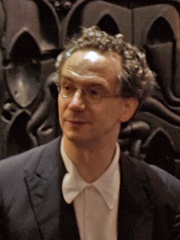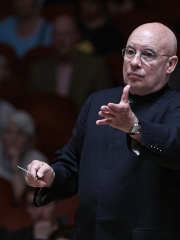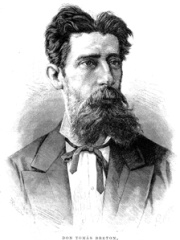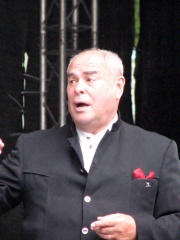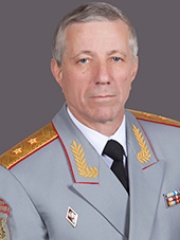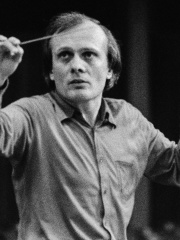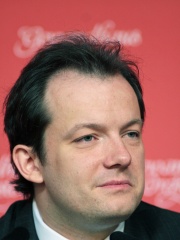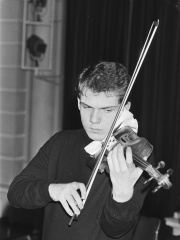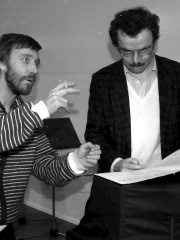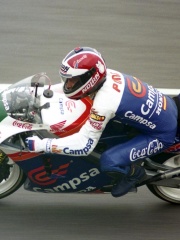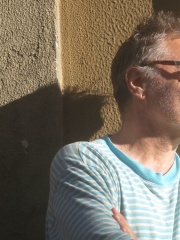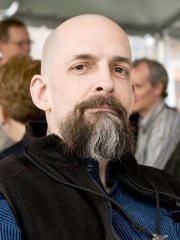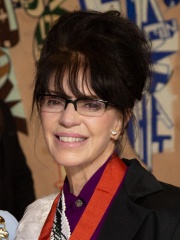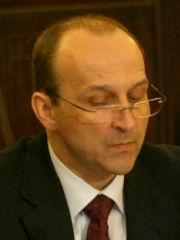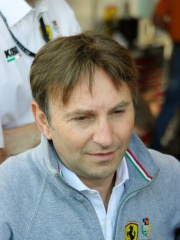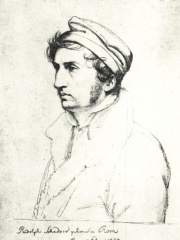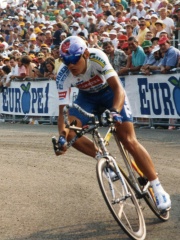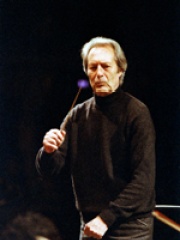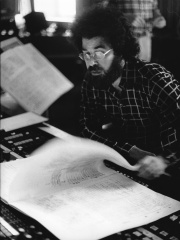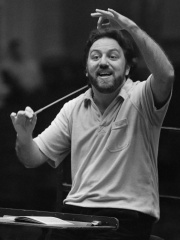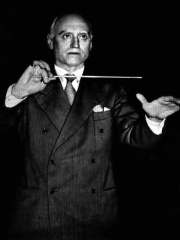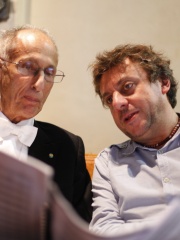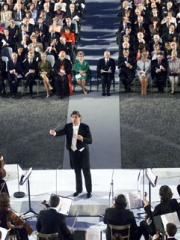Conductor
Fabio Luisi
1959 - today
EN.WIKIPEDIA PAGE VIEWS (PV)
 Fabio Luisi
Fabio Luisi
His biography is available in 16 different languages on Wikipedia. Fabio Luisi is the 107th most popular conductor (down from 93rd in 2024), the 3,649th most popular biography from Italy (down from 3,429th in 2019) and the 10th most popular Italian Conductor.
Memorability Metrics
Page views of Fabio Luisi by language
Among Conductors
Among conductors, Fabio Luisi ranks 107 out of 128. Before him are Milan Horvat, Jascha Horenstein, Dennis Russell Davies, Tomás Bretón, Eri Klas, and Valery Khalilov. After him are Zdeněk Mácal, Andris Nelsons, Nikolai Golovanov, Jaap van Zweden, Daniel Harding, and Okko Kamu.
Most Popular Conductors in Wikipedia
Go to all RankingsMilan Horvat
1919 - 2014
HPI: 56.33
Rank: 101
Jascha Horenstein
1898 - 1973
HPI: 56.25
Rank: 102
Dennis Russell Davies
1944 - Present
HPI: 56.19
Rank: 103
Tomás Bretón
1850 - 1923
HPI: 56.12
Rank: 104
Eri Klas
1939 - 2016
HPI: 56.04
Rank: 105
Valery Khalilov
1952 - 2016
HPI: 55.90
Rank: 106
Fabio Luisi
1959 - Present
HPI: 55.88
Rank: 107
Zdeněk Mácal
1936 - 2023
HPI: 55.58
Rank: 108
Andris Nelsons
1978 - Present
HPI: 55.38
Rank: 109
Nikolai Golovanov
1891 - 1953
HPI: 55.17
Rank: 110
Jaap van Zweden
1960 - Present
HPI: 55.04
Rank: 111
Daniel Harding
1975 - Present
HPI: 54.83
Rank: 112
Okko Kamu
1946 - Present
HPI: 54.70
Rank: 113
Contemporaries
Among people born in 1959, Fabio Luisi ranks 272. Before him are Zakir Hasanov, Akio Ōtsuka, Giovanna Amati, Sito Pons, Steven Erikson, and Kenneth Brylle. After him are Ali Bujsaim, Milcho Manchevski, Neal Stephenson, Fran Walsh, Kazimierz Marcinkiewicz, and Bernardo Rezende.
Others Born in 1959
Go to all RankingsZakir Hasanov
POLITICIAN
1959 - Present
HPI: 56.00
Rank: 266
Akio Ōtsuka
ACTOR
1959 - Present
HPI: 55.99
Rank: 267
Giovanna Amati
RACING DRIVER
1959 - Present
HPI: 55.97
Rank: 268
Sito Pons
RACING DRIVER
1959 - Present
HPI: 55.97
Rank: 269
Steven Erikson
WRITER
1959 - Present
HPI: 55.96
Rank: 270
Kenneth Brylle
SOCCER PLAYER
1959 - Present
HPI: 55.94
Rank: 271
Fabio Luisi
CONDUCTOR
1959 - Present
HPI: 55.88
Rank: 272
Ali Bujsaim
POLITICIAN
1959 - Present
HPI: 55.87
Rank: 273
Milcho Manchevski
FILM DIRECTOR
1959 - Present
HPI: 55.85
Rank: 274
Neal Stephenson
WRITER
1959 - Present
HPI: 55.85
Rank: 275
Fran Walsh
FILM DIRECTOR
1959 - Present
HPI: 55.82
Rank: 276
Kazimierz Marcinkiewicz
POLITICIAN
1959 - Present
HPI: 55.82
Rank: 277
Bernardo Rezende
VOLLEYBALL PLAYER
1959 - Present
HPI: 55.79
Rank: 278
In Italy
Among people born in Italy, Fabio Luisi ranks 3,650 out of NaN. Before him are Andrea Montermini (1964), Rudolph Schadow (1786), Marcus Ummidius Quadratus Annianus (138), Donato Bilancia (1951), Giovanni Lodetti (1942), and Claudio Chiappucci (1963). After him are Dario Marianelli (1963), Lorenzo Insigne (1991), Ezio Pascutti (1937), Aldo Campatelli (1919), Severino Rigoni (1914), and Adolfo Farsari (1841).
Others born in Italy
Go to all RankingsAndrea Montermini
POLITICIAN
1964 - Present
HPI: 55.91
Rank: 3,644
Rudolph Schadow
SCULPTOR
1786 - 1822
HPI: 55.91
Rank: 3,645
Marcus Ummidius Quadratus Annianus
POLITICIAN
138 - 182
HPI: 55.90
Rank: 3,646
Donato Bilancia
EXTREMIST
1951 - 2020
HPI: 55.90
Rank: 3,647
Giovanni Lodetti
SOCCER PLAYER
1942 - 2023
HPI: 55.89
Rank: 3,648
Claudio Chiappucci
CYCLIST
1963 - Present
HPI: 55.89
Rank: 3,649
Fabio Luisi
CONDUCTOR
1959 - Present
HPI: 55.88
Rank: 3,650
Dario Marianelli
COMPOSER
1963 - Present
HPI: 55.88
Rank: 3,651
Lorenzo Insigne
SOCCER PLAYER
1991 - Present
HPI: 55.87
Rank: 3,652
Ezio Pascutti
COACH
1937 - 2017
HPI: 55.87
Rank: 3,653
Aldo Campatelli
SOCCER PLAYER
1919 - 1984
HPI: 55.87
Rank: 3,654
Severino Rigoni
CYCLIST
1914 - 1992
HPI: 55.86
Rank: 3,655
Adolfo Farsari
PHOTOGRAPHER
1841 - 1898
HPI: 55.86
Rank: 3,656
Among Conductors In Italy
Among conductors born in Italy, Fabio Luisi ranks 10. Before him are Carlo Maria Giulini (1914), Giuseppe Sinopoli (1946), Riccardo Chailly (1953), Victor de Sabata (1892), Claudio Scimone (1934), and Daniele Gatti (1961). After him are Gianandrea Noseda (1964).
Carlo Maria Giulini
1914 - 2005
HPI: 66.30
Rank: 4
Giuseppe Sinopoli
1946 - 2001
HPI: 64.34
Rank: 5
Riccardo Chailly
1953 - Present
HPI: 63.32
Rank: 6
Victor de Sabata
1892 - 1967
HPI: 60.30
Rank: 7
Claudio Scimone
1934 - 2018
HPI: 57.86
Rank: 8
Daniele Gatti
1961 - Present
HPI: 57.40
Rank: 9
Fabio Luisi
1959 - Present
HPI: 55.88
Rank: 10
Gianandrea Noseda
1964 - Present
HPI: 47.58
Rank: 11
